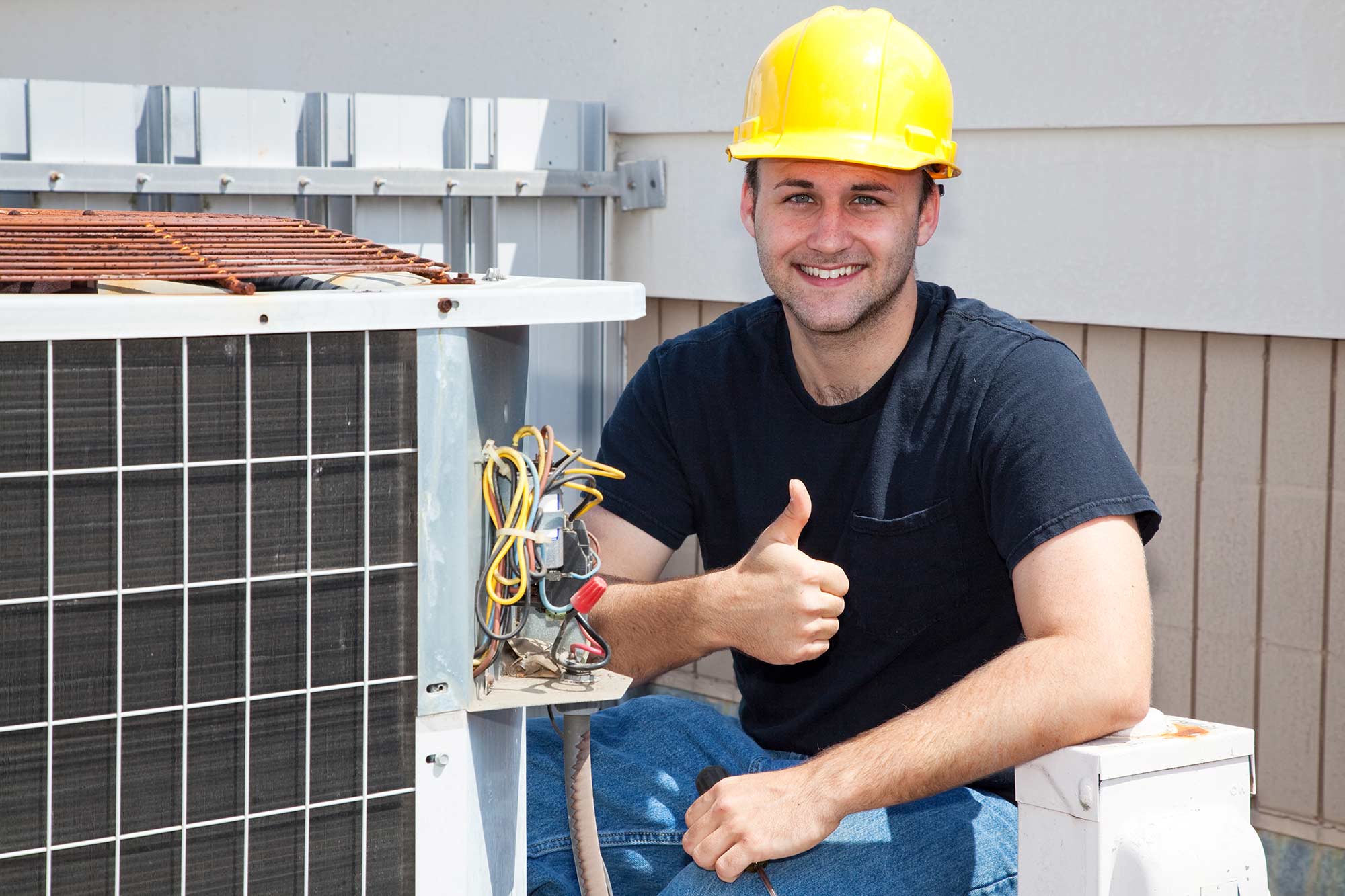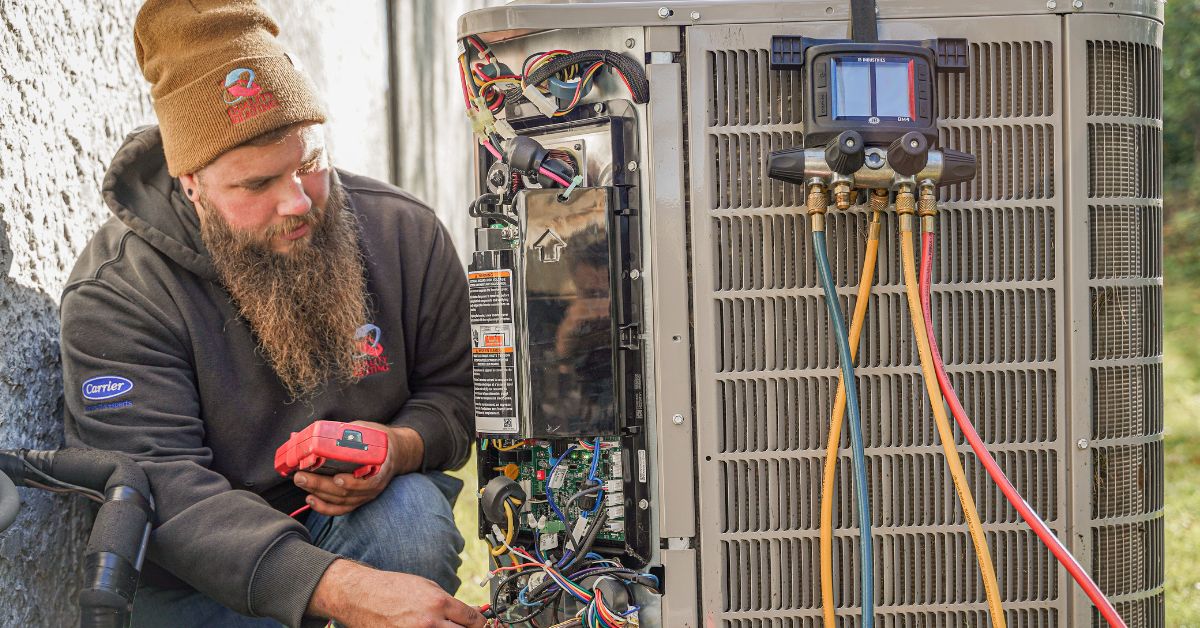AC repairman checklist: key parts to check
The Relevance of Heating And Cooling Expertise: Uncovering Sources Of Air Conditioner Issues for Homeowners
Homeowners typically neglect the value of understanding their HVAC systems. Identifying common indications of air conditioning troubles can cause prompt treatments. Issues like insufficient air conditioning or uncommon noises are not simply nuisances; they can show much deeper issues. By exploring the origin triggers of these troubles, property owners can boost system effectiveness and prolong its life-span. What are the most prevalent problems that can occur, and exactly how can they be efficiently addressed?
Common Indicators of Air Conditioning Troubles
How can property owners determine problems with their air conditioning systems before they escalate? Recognizing common indications of air conditioner troubles is crucial for prompt maintenance. One common indication wants air conditioning; if the a/c unit falls short to reduce the indoor temperature level, it may signify underlying problems. Uncommon noises, such as grinding or hissing, can additionally suggest mechanical failures or loosened elements - HVAC contractor. Additionally, homeowners need to be skeptical of odd odors rising from the unit, which may recommend mold and mildew development or electrical issues. Frequent biking on and off, referred to as short cycling, can indicate thermostat problems or refrigerant leaks. A rise in power bills without an equivalent surge in use may direct to inadequacy. By remaining alert to these indication, home owners can prevent much more significant concerns and costly fixings, ensuring their air conditioning systems operate efficiently throughout the warmer months

Comprehending Cooling Agent Issues
Refrigerant problems can greatly influence the performance of a cooling and heating system. House owners need to be mindful of the indicators of low refrigerant degrees and the significance of identifying refrigerant leakages. Resolving these troubles without delay can prevent more damages to the system and guarantee height cooling performance.
Low Refrigerant Levels
A common problem that home owners may come across with their heating and cooling systems is low cooling agent levels, which can substantially influence the system's performance and performance. Refrigerant is crucial for the cooling procedure, soaking up warm from indoor air and releasing it outside. When degrees drop, the a/c unit has a hard time to cool down the space properly, leading to boosted energy intake and potential system stress. Signs of reduced refrigerant include poor air conditioning, longer run times, and ice development on the evaporator coils. Homeowners may likewise notice uncommon noises as the compressor functions harder to make up for the deficiency. It is essential for house owners to understand the value of keeping correct refrigerant levels to ensure peak HVAC efficiency and durability.
Refrigerant Leaks Detection
Where might a property owner start when faced with the possibility of cooling agent leakages in their heating and cooling system? The primary step involves keeping track of the system's efficiency. Indicators such as lowered cooling down performance, ice formation on coils, or hissing noises may suggest a cooling agent leak. Homeowners should additionally look for noticeable indicators of oil deposit, frequently an indication of a leakage. Utilizing a refrigerant leak detector can offer more accurate identification. If suspicions linger, speaking with a certified HVAC technician is essential, as they possess the know-how and equipment to find leakages efficiently. Motivate detection and repair work of refrigerant leaks not only improve system performance yet likewise avoid possible environmental damage, making it an important element of HVAC upkeep.
Electrical Failures and Their Effect
Electrical failures can significantly impact heating and cooling systems, particularly through concerns like circuit breaker breakdowns and defective circuitry. These issues not just interrupt the system's performance however can additionally lead to costly repair work and safety dangers. Comprehending the ramifications of such failures is essential for homeowners to preserve a reliable and secure HVAC environment.
Circuit Breaker Issues
Just how can breaker concerns impact the effectiveness of an a/c system? Breaker act as vital safety and security devices that handle electrical flow to a/c devices. If a circuit breaker journeys frequently, it interferes with power supply, leading to irregular heating or cooling. This can cause significant pressure on the system, leading to inefficient procedure and potential damage to parts. Home owners may see increased energy bills as a their explanation result of the heating and cooling system's struggle to preserve desired temperature levels. Furthermore, repeated disruptions from stumbled breakers can reduce the life-span of the air conditioner device, requiring pricey repair services or substitutes. Regular maintenance of circuit breakers is important, as it ensures a secure power supply, inevitably enhancing the general effectiveness of the a/c system.
Faulty Wiring Effects
Regularly forgotten, malfunctioning wiring can have dire repercussions for cooling and heating systems. Circuitry concerns may bring about brief circuits, resulting in regular malfunctions and enhanced repair work costs. On top of that, incorrect circuitry can cause inefficient power usage, leading to greater energy expenses and pressure on the system. In serious cases, damaged wiring can activate electrical fires, posturing a considerable security risk to house owners. In addition, these electric failures can harm cooling and heating parts, resulting in pricey substitutes or extensive repair work. Homeowners should prioritize regular assessments by certified specialists to determine and remedy electrical wiring issues before they rise. Recognizing the ramifications of defective circuitry can assist ensure the longevity and safety and security of heating and cooling systems, ultimately shielding both the home and its owners.
Clogged Filters and Their Consequences
While lots of property owners might forget the value of regular filter maintenance, clogged filters can cause significant consequences for HVAC systems. When filters become obstructed with dust, dirt, and debris, air movement is limited. This decrease in air movement compels the system to work harder, causing raised energy usage and possibly higher utility costs. Gradually, this pressure can create wear and tear on elements, resulting in premature system failure.
In addition, stopped up filters can compromise interior air high quality. Contaminants and allergens may circulate throughout the home, exacerbating breathing problems and allergic reactions for owners. Additionally, inadequate air flow can cause the evaporator coil to ice up, bring about costly fixings and inefficient cooling performance. Consistently transforming or cleansing filters is a basic yet essential maintenance task that can aid guarantee the longevity and efficiency of cooling and heating systems, ultimately benefiting both the homeowner's comfort and their financial resources.

Thermostat Malfunctions Described
What takes place when a thermostat breakdowns can significantly affect both comfort and energy performance in a home (Fix broken Air conditioner). A malfunctioning thermostat may fail to accurately read the temperature level, causing overcooling or insufficient cooling. This inconsistency can trigger pain for passengers and cause higher energy costs, as the heating and cooling system works more difficult than essential
Common problems consist of dead batteries, which can render electronic thermostats inoperative, and loose circuitry that interferes with communication between the thermostat and the heating and cooling system. In addition, outdated or poorly calibrated thermostats might not respond properly to temperature adjustments, further aggravating energy inefficiency.
House owners must be vigilant for signs of malfunction, such as irregular temperatures or unforeseen energy expenses. Normal checks and understanding of the thermostat's functionality can assist identify issues early, ensuring peak efficiency of the a/c system. Attending to thermostat issues quickly is necessary for keeping a comfortable living atmosphere and managing energy intake successfully.
The Function of Normal Upkeep
Regular maintenance plays a crucial role in ensuring the long life and effectiveness of HVAC systems. Homeowners who focus on routine checks can prevent small issues from rising into pricey repairs. Regular upkeep generally includes jobs such as cleansing filters, evaluating ductwork, and checking cooling agent degrees. These activities aid keep perfect air flow and system efficiency, minimizing energy intake.
A properly maintained Cooling and heating system operates much more efficiently, supplying regular comfort throughout the home. Routine tune-ups can likewise prolong the life expectancy of the unit, causing considerable savings with time. House owners are motivated to arrange expert inspections at least as soon as a year to recognize possible issues early.
Furthermore, many makers need regular maintenance to support service warranties, making this technique not just beneficial yet commonly needed. Overall, recognizing the value of routine maintenance equips property owners to secure their heating and cooling systems against unforeseen failures and enhance their financial investment in home convenience.
Often Asked Inquiries
How Can I Enhance My Ac's Power Performance?
Improving an air conditioning's energy efficiency entails routine upkeep, cleansing or replacing filters, securing ductwork, making certain correct insulation, utilizing programmable thermostats, and organizing expert evaluations to determine and fix potential concerns influencing performance.
What Is the Life expectancy of a Common A/c Unit?
A typical cooling device has a life-span of 15 to twenty years, depending on maintenance, use, and environmental factors. Normal upkeep can substantially extend its operational life and improve general performance.
When Should I Replace My A/c System?
An air conditioning system ought to normally be changed every 10 to 15 years. Signs for replacement include frequent repair work, increasing power costs, and inadequate air conditioning, indicating that an upgrade may be site web extra affordable and effective.
Can I Repair Air Conditioning Problems Myself?
Yes, individuals can repair AC issues themselves by checking filters, making sure power supply, and examining for visible issues (AC repairman). Complex troubles usually call for expert support for exact diagnosis and risk-free repair service, ensuring suitable system efficiency.
Exactly how Do I Choose a Trusted A/c Professional?

To choose a trusted heating and cooling technician, one need to look for recommendations, examine online reviews, confirm licenses and insurance policy, analyze experience, and request detailed estimates to this hyperlink guarantee high quality service and fair prices before deciding.
Final thought
To sum up, a strong understanding of HVAC systems enables property owners to properly identify and attend to usual air conditioning issues. Recognizing indications such as poor air conditioning or rising power costs enables for timely treatments, which can substantially boost system performance and long life. By staying educated concerning possible troubles like cooling agent leaks, electric failings, and blocked filters, property owners can take positive steps to maintain their systems, inevitably guaranteeing convenience and promoting a healthier living environment. Normal upkeep stays crucial to this venture.